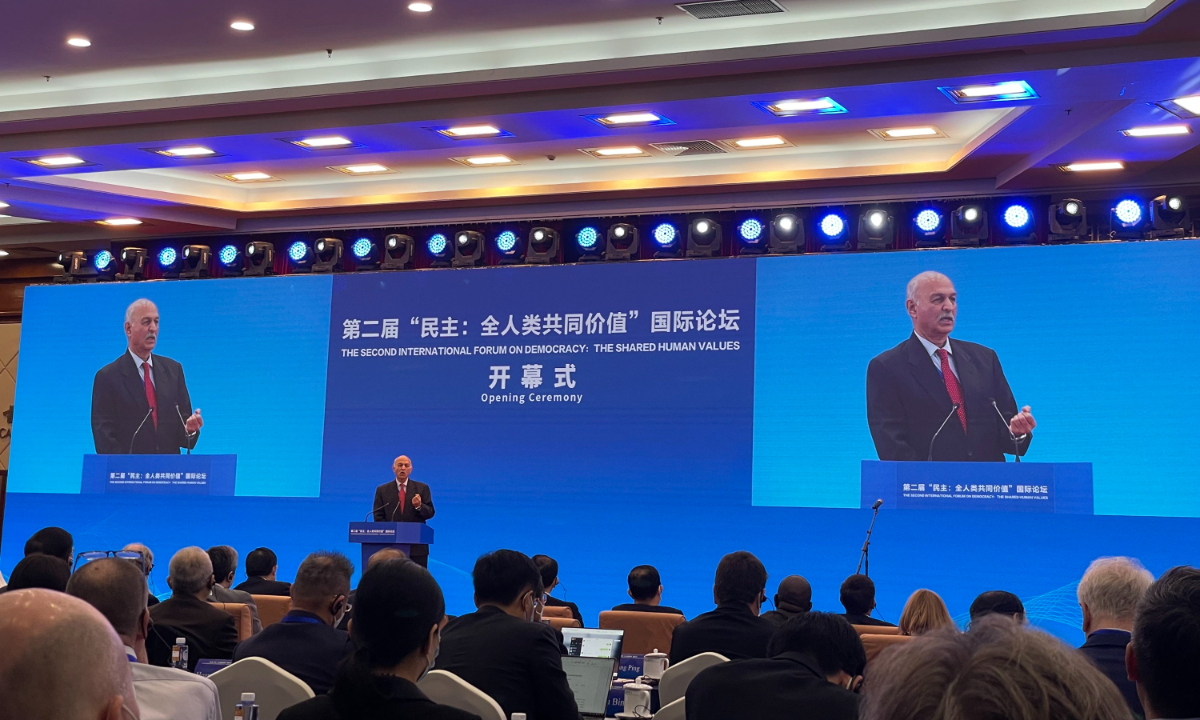Global diplomats, politicians, scholars gather in Beijing to share views on democracy

The Second International Forum on Democracy: shared human values is held in Beijing on March 23. Photo: Liu Xin/GT
More than 200 politicians, scholars and experts in various fields from over 100 countries and regions gathered in Beijing on Thursday at an international forum to share their understanding of democracy and how countries should explore their own path to democracy with many attendees also opposing some certain country's hegemonic exporting of its own form of democracy and weaponizing of democracy to contain other countries.
The forum, titled "The Second International Forum on Democracy: shared human values" was jointly held by the Chinese Academy of Social Sciences and think tanks from Cambodia, Chile, Nigeria, Spain and Tonga with experts from both Western countries and the Global South attended.
The event was held in Beijing days before the US' so-called second Summit for Democracy and analysts said the Beijing event's open and inclusive atmosphere sat in stark contrast to the US touting the "democracy versus authoritarianism" narrative.
Li Shulei, a member of the Political Bureau of the Communist Party of China (CPC) Central Committee and head of the Publicity Department of the CPC Central Committee delivered a keynote speech at the event, in which he said democracy is a shared value for mankind and also the very thing that the CPC and Chinese people have persistently pursued in advancing Chinese modernization.
During the just-finished two sessions, nearly 3,000 deputies to the National People's Congress and more than 2,000 representatives from the Chinese People's Political Consultative Conference (CPPCC) National Committee had gathered to jointly contribute to the country's development, showcasing China's whole-process people's democracy has been interwoven in the building of Chinese modernization, Li said.
Democracy is diversified and there is not only one way to achieve democracy. There are no two identical political systems in the world nor is there a form of democracy that fits all countries. Assessing a political structure with predefined criteria should not be allowed, and countries should use the democratic system that best fits their domestic environment, Li said.
Each country should choose their own path for democracy in accordance with national conditions. Whether a country is democratic or not should be judged by the people in the country instead of a handful of countries. Imposing its democracy to other countries or inciting confrontations under guise of "democracy versus authoritarianism" is harmful and actually tramples on the idea of democracy itself, Li said.
Looking at the current global landscape, democracy, fairness, equality and justice are still far from being realized. Certain major powers hold onto unilateralism, place their own rules above overall international interest and order, impose extreme pressure to contain other countries, which combined pose a severe threat to the stability of regional and global security, said Li.
Major powers should act to share responsibilities and work with the international community to promote global peace and development, instead of bullying others. The real obstacle that hinders mankind's cause for democracy is not the different forms of democracy but certain country's arrogance and prejudice on other countries' exploring for democracy and the imposition of exporting its own democracy, said Li.
Politicians and scholars from more countries, including Spain, Japan, Zambia, Thailand, the US and the UK were invited to deliver keynote speech to share their views on democracy at the opening ceremony of the event.
Many experts spoke highly of China charting its own path of democracy and praised China's achievements in economic developments and poverty alleviation.
"We have seen how China has progressed. We see major examples that we can learn from China in democratic development and building a peaceful and prosperous future. First, this has to be the essence of democracy that people decide their own future. Second, democracy must deliver to the people," Mushahid Hussain Sayed, Chairman of Pakistan Senate Defense Committee said at the forum.
Fred Mmembe, President of the Socialist Party of Zambia, said that China is a country that has developed itself without colonies, without plundering any country in the world, without subjugating in any people in the world. This is a country that is developing with maximum respect, for others, for their history, for their cultures, and recognizes a diversity that is there in civilization.
He mentioned that March is a global month of democracy discourse as a conference on democracy will be held and led by the US in Zambia at the end of this month.
"A country that has toppled so many governments in Africa, that has led so many coups in Africa and other parts of the world, a country that has killed so many of our leaders in Africa and other parts of the world… a country that has been built on a brutal force on enslavement of other human beings, on the humiliation of Africans, the exploitation of Africans, today is coming to teachers about democracy. That's the arrogance, the imperialist arrogance," said Mmembe.
"If you have no respect for the dignity of others, if you have no respect for the sovereignty of other countries, you cannot claim to be a champion of democracy," said Mmembe.
On March 29 to 30, the US will host the so-called second Summit for Democracy together with some other countries, an event that has been criticized as more like pulling together an "interests camp."


